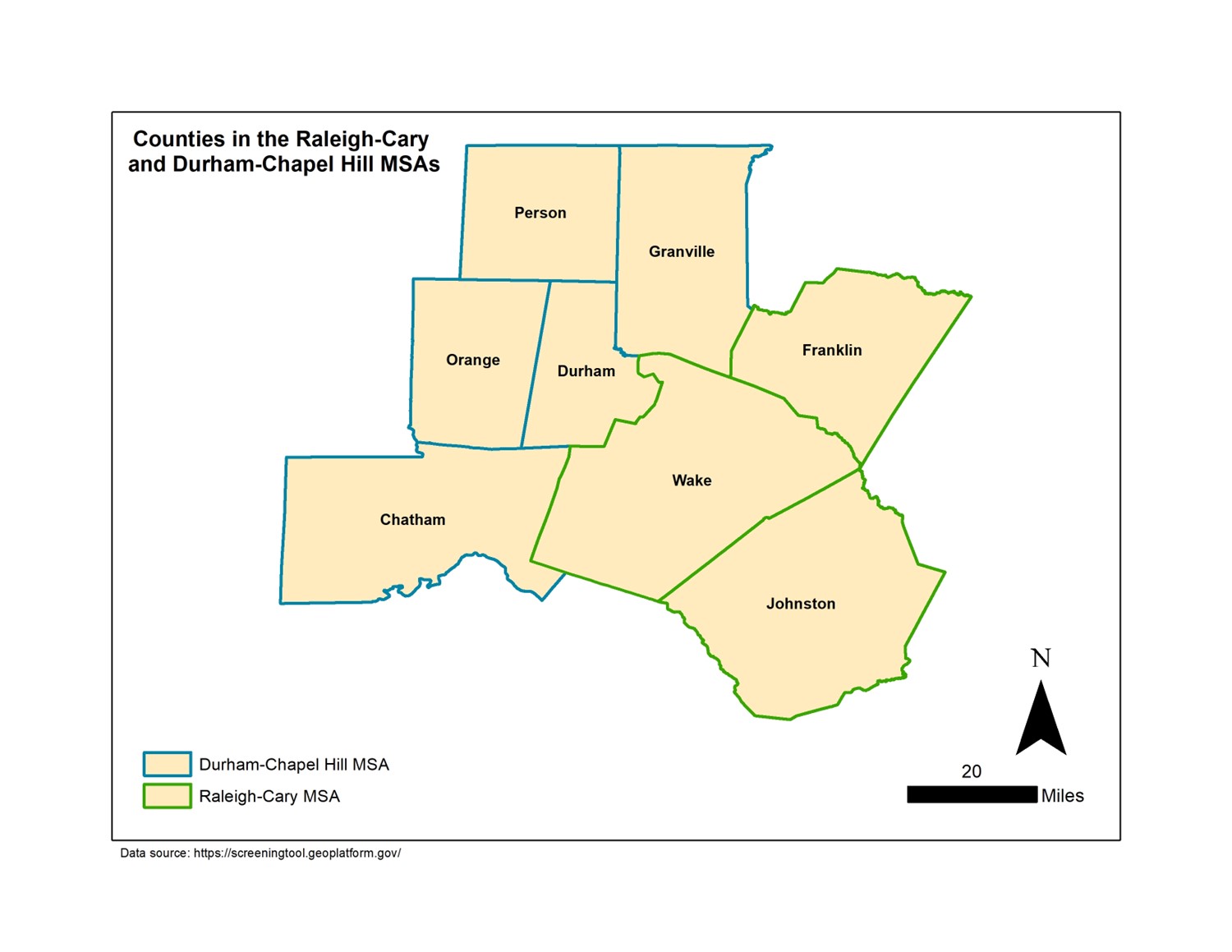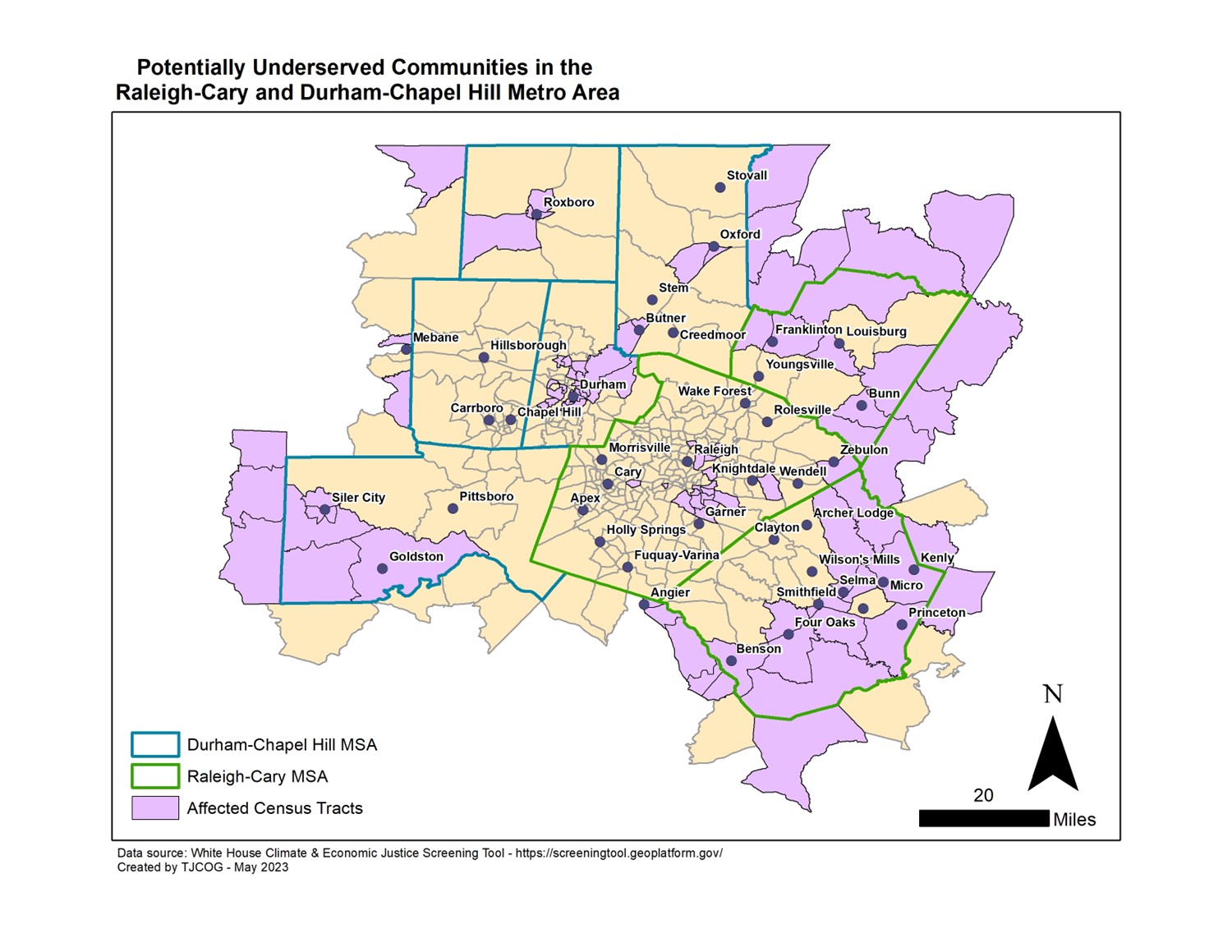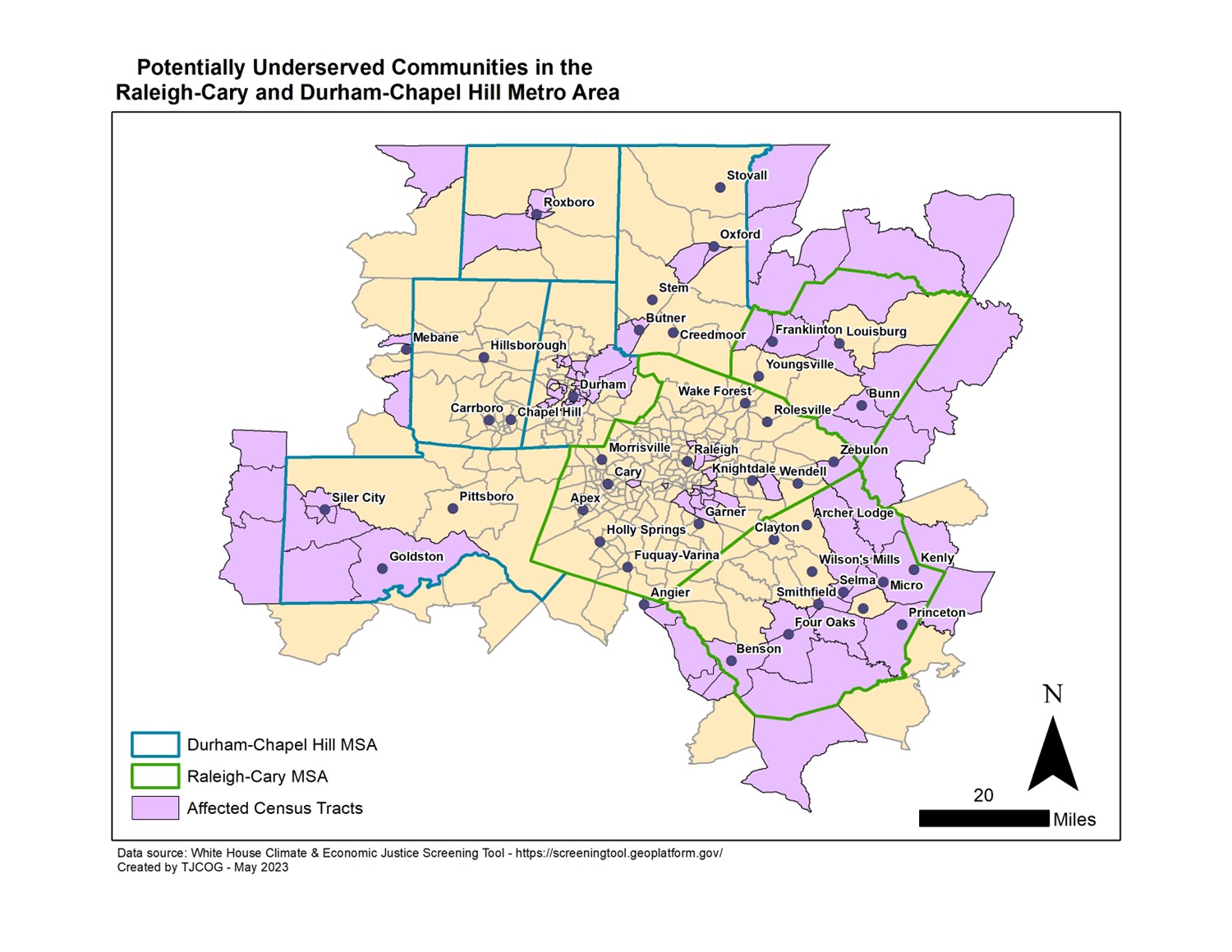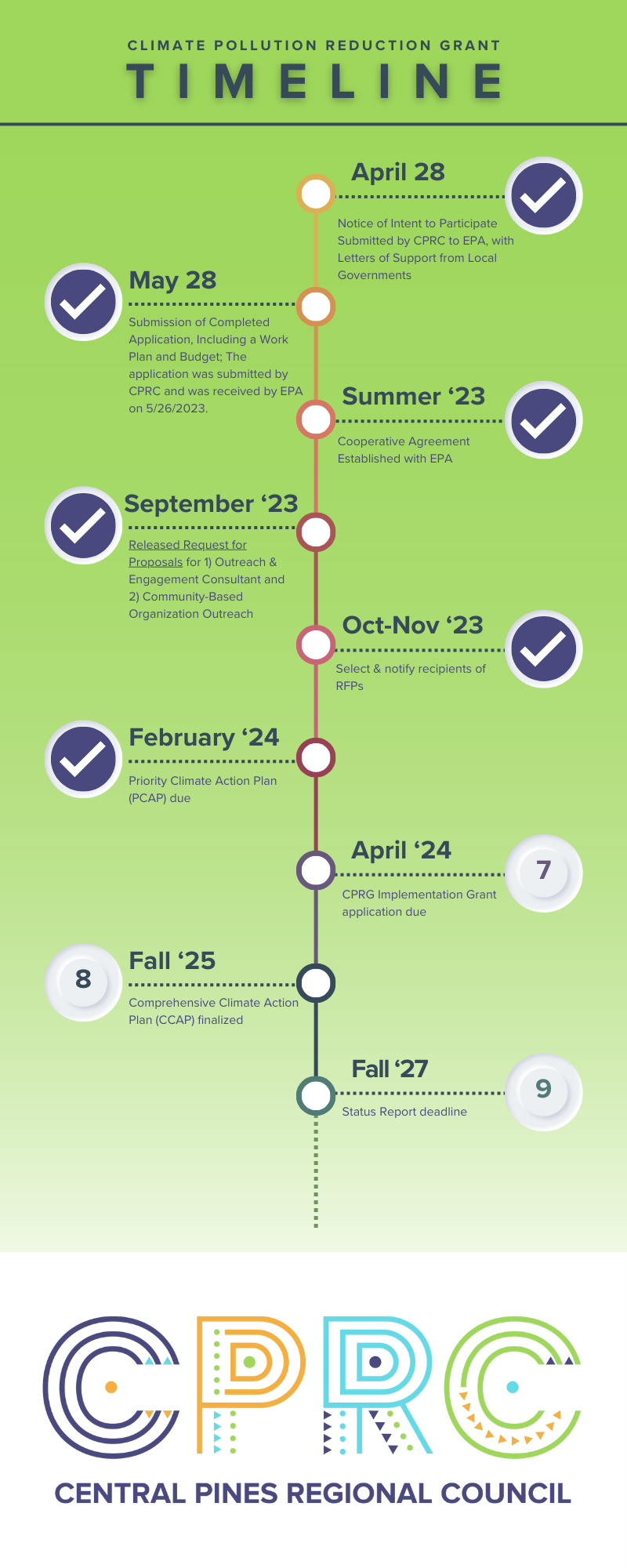CPRC is the lead agency for a $1M planning grant through the U.S EPA's Climate Pollution Reduction Grant Program (CPRG), a two-stage grant program that includes funding for noncompetitive planning grants and competitive implementation grants.
Key Highlights
- Funding is provided by the U.S Environmental Protection Agency (U.S EPA)
- Work will span a time frame of 4 years, from 2023-2027
- Central Pines Regional Council has chosen to cover both the Raleigh-Cary MSA and the Durham-Chapel Hill MSA in the planning process.
- Ultimately, the process will produce a concrete list of tactics to reduce climate pollution across our region.
Beginning in Fall 2023, CPRC will work with local governments to conduct extensive community engagement and develop two climate action plans for the Raleigh-Cary MSA and Durham-Chapel Hill MSA to reduce greenhouse gas emissions and climate pollution. Projects included in the plan will be eligible for U.S EPA's competitive implementation grants. Additionally, the plan will be developed in coordination with other CPRG plans being created in the state - the State of North Carolina and the Charlotte-Concord-Gastonia MSA - and local climate plans already underway.
There are 3 key deliverables for this grant:
Priority Climate Action Plan (PCAP) - Due February 2024
- Comprehensive Climate Action Plan (CCAP) - Fall 2025
- Status Report - Fall 2027
 |  |
Central Pines Regional Council received a $1 million planning grant through the U.S EPA’s Climate Pollution Reduction Grant Program, a two-stage grant program that includes funding for planning grants and competitive implementation grants. Our staff will serve as the lead entity for an 8-county area, representing the Raleigh-Cary and Durham-Chapel Hill Metropolitan Statistical Areas (MSAs), and will prepare a single Regional Climate Action Plan to reduce greenhouse gas emissions and climate pollution. Once complete, our local governments will be able to apply for $4.6 billion in competitive funding, authorized by the Inflation Reduction Act, to implement projects and actions included in the climate plan.
Central Pines Regional Council will lead coordination of the planning process with local governments and partners advisors across our region to ensure the plans can serve as a long-term framework for local and regional action. The process will include extensive community engagement and provide financial and administrative support to selected community-based organizations to engage local communities about the greenhouse gas reduction measures that would best serve our/their communities. The plan will also be developed in coordination with other climate action planning processes for the State of North Carolina and the Charlotte-Concord-Gastonia region.
The planning process will also offer our region the opportunity to identify ways to collaborate and integrate local priorities into large-scale projects for efficient infrastructure, transportation systems, energy efficient buildings, logistics and distribution systems, energy and waste management systems, and agriculture and food production. This framework will provide each unique community with the tools to implement solutions that address the local needs they find most urgent and beneficial.
CPRG Regional Government Steering Committee Minutes

We are working to summarize the tactics in existing climate plans, such as the completed plans for the City of Raleigh, the Town of Chapel Hill, and Orange County, and working with communities with a climate plan underway like Cary, NC.
Completed Plans:
In Progress:
NC Clean Energy Technology Center
The NC Clean Energy Technology Center at NC State University advances a sustainable energy economy by educating, demonstrating, and providing support for clean energy technologies, practices, and policies. It also administers the Database of Incentives for Renewables & Efficiency (DSIRE), a resource providing financial incentives and policies.
Visit NC Clean Energy Technology Center Website
UNC Department of City and Regional Planning
The University of North Carolina at Chapel Hill is a leader among planning schools with world-class faculty and high-impact research. Located in the booming Research Triangle, Carolina Planning is a center of collaboration and innovation in the economic, housing, community development, transportation, land use and environmental planning that shapes our cities and regions of the world.
UNC Department of City & Regional Planning Website
Triangle Sustainability Partnership
Triangle Sustainability Partnership is a local government partnership of 12 communities consisting of Central Pines Regional Council, its participating members, Holly Springs, Chatham County, City of Raleigh, Durham County, City of Durham, Town of Cary, Town of Chapel Hill, Town of Hillsborough, Town of Carrboro, Town of Apex, Town of Morrisville, Orange County, Town of Zebulon, and Solar CrowdSource.
Kerr-Tar Regional Council of Governments
Kerr-Tar COG provides important community connections in Person, Franklin, and Granville Counties for this grant.
The CPRG (Climate Pollution Reduction Grant) Regional Government Steering Committee currently consists of representatives from the following communities:
- Chatham County
- City of Durham
- City of Raleigh
- Durham County
- Franklin County
- Granville County
- Kerr-Tar Regional Council of Governments
- Orange County
- Person County
- Town of Apex
- Town of Carrboro
- Town of Cary
- Town of Chapel Hill
- Town of Hillsborough
- Town of Holly Springs
- Town of Morrisville
- Town of Wake Forest
- Town of Zebulon
- Wake County
EPA has announced two competitions for CPRG implementation grants – a general competition for applications from states, municipalities, tribes, tribal consortia, and territories, and a competition only for tribes, tribal consortia, and territories. These competitions are open to entities that received planning grants to develop Priority Climate Action Plans (PCAPs) under phase 1 of the CPRG program, as well as entities that did not directly receive a planning grant that are applying for funds to implement measures included in an applicable PCAP. Eligible applicants may only apply for funding to implement measures contained in an applicable PCAP.
For the general competition, EPA anticipates awarding individual grants between $2 million and $500 million, with funding tiers allowing comparably sized projects to compete against one another. For the competition for tribes and territories, EPA anticipates awarding individual grants ranging between $1 million to $25 million.
The Team
 |  |  |
Emily Barrett | Shuchi Gupta | Beth Davis |
| Environment & Resilience Director | Principal Planner | Member Engagement Coordinator |
| ebarrett@centralpinesnc.gov | sgupta@centralpinesnc.gov | bdavis@centralpinesnc.gov |
